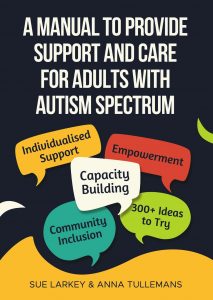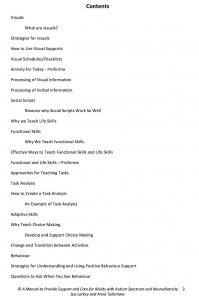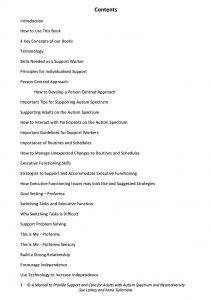A Manual to Provide Support and Care for Adults with Autism Spectrum
by Anna Tullemans and Sue Larkey
ISBN 978-0-6483806-2-7
Here is another common-sense manual from Anna Tullemans and Sue Larkey; this time to benefit support workers of adults on the autism spectrum.
In this book, the authors show workers how to provide support to the individual in accordance with that client’s specific needs. They suggest how workers can teach empowerment to their clients and how to encourage inclusion of their clients in the community.
Larkey and Tullemans remind readers that support workers are role models to the people they support. It is without doubt that many clients see their support worker as a friend, so it’s important for workers to know they are seen as role models.
Under the World Health Organisation’s strategy to put people and communities at the centre of health care, the book addresses clients from a person-centred approach and it teaches workers how to develop this skill.
Every page is packed with suggestions for workers to encourage their clients to develop skills in areas such as: – 
- managing unexpected changes to routines and schedules
- goal setting and problem solving
- using technology to develop independence
- communicating with significant people
- adapting, whether that be in communication, socialisation or simply to try different foods
- reducing anxiety and coping with sensory overload
Larkey and Tullemans suggest how a person with autism looks and behaves in certain situations and they postulate why their chosen strategies work. Conversely, they indicate why some strategies don’t work.
The authors provide pro forma for adults with autism to complete. The pro forma help both worker and client to better understand the client’s needs. Once again salient points workers should note are in shaded boxes for easy identification.
The authors remind readers of the four key concepts included in all their books. They are: –
- To know someone with autism is NOT to know autism.
- Each client is an individual with specific requirements. It is the support worker who must adapt his/her skills to the needs of the client. When support workers work with the client, the latter may enjoy successful outcomes.
- Be adaptable. Not every strategy works for every individual. Workers may have to try a few before finding one that works.

- Support staff may find that strategies lose their lustre, and they have to change approaches for an individual, sometimes more than just occasionally.
This is such a valuable book, and it should be in every workplace that practices inclusion.
